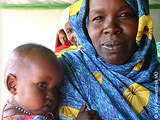Intel Brief: The Chad Withdrawal
By Anna Dunin for ISN
Noteworthy reduction or even full withdrawal of UN forces will result in the deterioration of the safety of the refugees and humanitarian personnel, as well as compromise humanitarian aid delivery to more than 500,000 refugees and internally displaced persons (IDPs) in northeastern Chad.
The country's security forces, which according to Chadian President Idriss Deby will replace MINURCAT and prevent the creation of a security vacuum, are largely incompetent and even if deployed to the area, will likely focus on other missions, rather than provide security to the refugee camps.
In March 2010, Deby accused MINURCAT of being redundant and ineffective, and external pagecalled for withdrawalcall_made of its military component, asserting that the national security forces will take responsibility for the protection of civilians in eastern Chad. Deby ultimately agreed to a external pageshort extensioncall_made of MINURCAT’s mandate until 15 May. With the deadline approaching, UN Secretary General Ban Ki-Moon external pagesubmitted a reportcall_made to the UN Security Council (UNSC) suggesting a one-year extension and external pagerevision of the mission’s mandatecall_made, which would allow for a phased shift of the responsibility for maintenance of security to Chad’s forces.
Ban's suggestion envisions pulling out 1,400 peacekeepers by 15 July, with the remaining 1,900 starting their withdrawal on 15 October. This process would enable the Mission to gradually transition from the Chapter VII to the Chapter VI external pagemandatecall_made, while MINURCAT’s police component would continue to train the local security forces, external pageDétachement Intégré de Sécurité (DIS)call_made, enabling them to become self-sustainable.
On 12 May, amid fears of increased violence, the UNSC external pagedeterminedcall_made that the situation in the region continued to pose a threat to international peace and security and extended the current mandate of MINURCAT until 26 May in order to closely examine the secretary-general’s recommendations. While another short-term extension of the mission’s mandate is possible, Deby will likely push for the peacekeeping mission to leave the country before the 2011 elections.
Considering their current state, Chad’s security forces will not be able to fill the security vacuum created by the withdrawal of the UN Mission, resulting in a deterioration of the already volatile security situation. While Deby argues that his troops are capable of maintaining security in the country, it is likely that these forces will focus on guarding the border between Sudan and Chad, rather than providing security to the refugee camps, leaving them vulnerable to attacks by both rebels and common criminals.
Chad planning military offensive?
Moreover, Deby’s request for MINURCAT’s withdrawal and his recent agreement with Sudan regarding border protection between the two states indicate that Chad could be planning a military offensive against the rebel groups. Additionally, reports suggest that members of Lord’s Resistance Army (LRA) have settled in southern Sudan and from there ventured into eastern Central African Republic (CAR) to raid villages. Renewed violence in the region could result in a new wave of refugees or IDPs fleeing to the camps, increasing pressure on humanitarian agencies.
MINURCAT's withdrawal will endanger refugees and compromise delivery of humanitarian aid and food to more than 250,000 external pagerefugees from Darfurcall_made, 75,000 from CAR and 160,000 IDPs from Chad. While the UN Mission in Chad is not able to guarantee complete safety, it is certainly external pagevital to the stability of the regioncall_made. MINURCAT’s partial withdrawal will undoubtedly weaken security of the convoys carrying aid, and result in increased levels of crime targeting humanitarian workers.
The external pagelevel of violencecall_made, including kidnappings, carjacking and armed robberies, human rights abuses and overall insecurity will almost certainly elevate. The UN peacekeepers and police provide escorts for World Food Bank transports, which are external pagealready frequent targetscall_made of attacks and robberies. Attacks and kidnappings targeting humanitarian workers became more common in late 2009 and in early 2010, reaching a frequency of one per week. As the security situation worsened, external pagea number of non-governmental organizationscall_made, including Doctors Without Borders, the International Committee of the Red Cross and the Agency for Technical Cooperation and Development, suspended services in some areas, including Dogdoré and Goz Beida, and recalled their employees due to the high risk of abduction.
The UN Mission in Central African Republic and Chad was established by external pageSecurity Council Resolution 1778call_made in 2007 with a external pagemandate to protect civilianscall_made, especially refugees and IDPs, facilitate the delivery of humanitarian aid and help improve the security situation in the region, under Chapter VII of the UN Charter. The UNSC created the mission mainly to assist the refugees from Darfur who fled to eastern Chad and north-eastern Central African Republic, but were still exposed to attacks by armed Sudanese rebel groups. Apart from providing security, the Mission also provided external pagelogistical support to the local authoritiescall_made, i.e. with medical evacuations. MINURCAT never reached its authorized contingent of 4,900 and its current strength includes 2,510 troops, 260 police officers and 975 civilian personnel.

